The 5th Hong Kong International Film Festival, part two
More of my notes from the 1981 Hong Kong International Film Festival… and once again I haven’t edited these reviews in any way, although in some cases I no longer agree with what I wrote back then.
2. ASIA
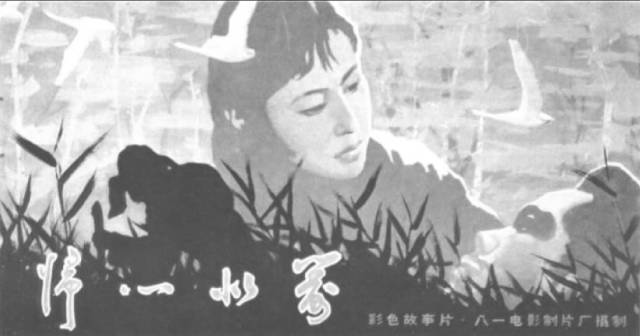
Li Jun’s ANXIOUS TO RETURN, made in communist China, was sincere, and a bit naive. It tells of a dedicated communist soldier during the Second World War who gets separated from his unit. He has to contend with a number of things on his quest to return to his comrades – unpatriotic Chinese collaborating with the Japanese, the Japanese themselves, a group of outlaw gold prospectors who live apart from the conflict sort of secure in their own little society, and finally the comforts of a loving woman in an idyllic setting. He has to escape them all – some against involuntary imprisonment, some against the temptation of personal security. For he’s dedicated to the larger cause of revolution and freedom and will only be able to think of himself when these goals have been achieved. It’s all rather slow and unsubtle, but not dull and didactic; although his ultimate course is never in doubt, the hero does undergo some inner conflict in maintaining it. Though technically similar to LITTLE SWALLOW’S SONG, the film I saw in Hangchou, it shows a better grasp of story-telling and manages not to be annoyingly simplistic.
*
The Asian films as a whole tended to be technically a bit rough – and almost all badly subtitled – but beyond those points, their individual qualities varied widely.
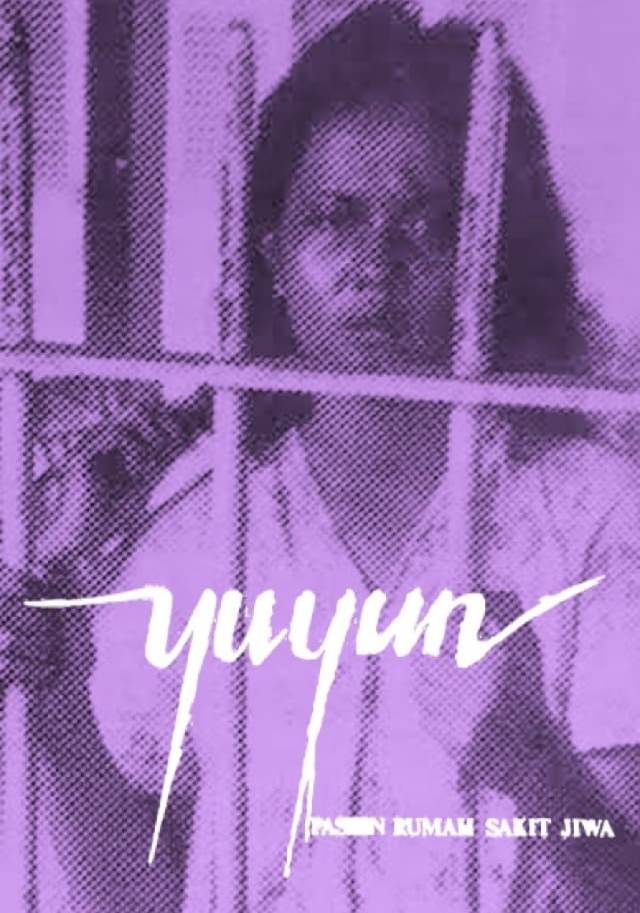
YUYUN, A PATIENT IN A MENTAL HOSPITAL, an Indonesian film by Arifin C. Noer, was overall a sincere attempt to show the problems faced by a girl who has had a breakdown in a society which has a pretty backward view of mental problems. Having been jilted, Yuyun cracks up; her doctor traces the real causes back to a family situation full of conflict (centred on an unreliable, occasionally violent father). The doctor works with the family and helps them to regroup and try again. But the neighbours are hard on the girl – there’s a lot of gossip, kids ridicule her…. With her father’s help she gets a job in another town. She’s a good and valuable worker, but when her boss discovers her history, he fires her. She runs back to the hospital, insisting she’ll never leave because that’s where everyone wants her to be….
All well and good. But the drastic shifts of style and tone are bewildering to someone whose experience is Western. For the first half hour Yuyun isn’t a very sympathetic character – she spends the whole time screaming hysterically in a piercing voice. But the film becomes more involving as the problems in the family are brought out (the father isn’t just a simple lout, but a fairly well-drawn character with both good and bad points). Then suddenly, it’s as if it becomes another film. When she gets her job, it develops into a love story which is all overdrawn gestures, ludicrous exaggeration – it seems to be a parody of old silent melodramas, silent comedies, and TV commercials, complete with elaborate dream sequences (including Beethoven’s Fifth given a disco arrangement by, according to the credits, the BeeGees). It’s hilarious, reminiscent of Second City’s Bad Acting In Hollywood – except that it feels wrong to laugh because of the serious context in which it occurs.
The sound was awful (painfully sharp music, poor post-dubbing, clumsy effects – the sound of a motorcycle stops abruptly as soon as it has moved out of frame), the photography variable, at times out of focus. And – something which was to become familiar – the subtitling was lousy, with some scenes completely without (including the opening: everyone thought they’d brought in an un-subtitled print).
*
Among the Asian films, the most interesting national group came from Thailand: three films, all serious, all quite well made if a little too long, and all quite different from each other.
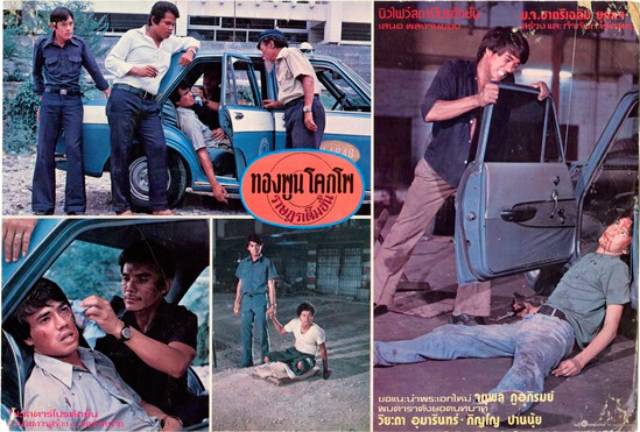
THONGPOON KOKPO (aka TAXI DRIVER, aka THE CITIZEN) is an updated version of BICYCLE THIEVES – but it’s not just a rehash: writer/director/photographer/editor Prince Chatri-Chalerm Yukol has updated it and transposed it to Thai society so that it stands entirely on its own, relevant to its own situation. Thongpoon has gone to the city with his small son, worked for years to save enough to buy his own taxi, be his own boss, and provide the boy with the education he never had himself. Soon after buying the car, he’s beaten and robbed, the taxi stolen. The police can’t do much. Without money, he’s kicked out of his slum room, and has to take shelter with a whore he earlier tried to convince to give up her work. With the help of a crippled beggar (a very entertaining, unsentimental character), he sets out to track down the thieves. The chief culprit is a rich businessman, so careful that the law can’t touch him. Thongpoon goes after him alone – his raid on the man’s garage is a bloody mess – and futile; the law works for the rich, not for their oppressed victims. The relationships in the film are all dealt with without sentiment, Thongpoon’s obsessive search ruining the lives of all around him. Unlike in DeSica’s film, it isn’t a case of everybody’s poor and struggling amongst themselves to survive: here society is split into exploiters and exploited, with the rules in favour of the former. Still, it does make the point that things won’t change as long as the victims refuse to act together and help each other – Thongpoon gets little help from his fellow taxi drivers, all potential victims of the same businessman. Overall, it’s an effective film, its depiction of the Bangkok poor convincing and unsentimental (the slum dwellers waiting to prey on any of their number who fall), as is the love story with the whore. The performances are generally quite good, though Thongpoon is presented as a bit too naive in his noble obsession – his actions occasionally border on the stupid. And it’s technically competent.
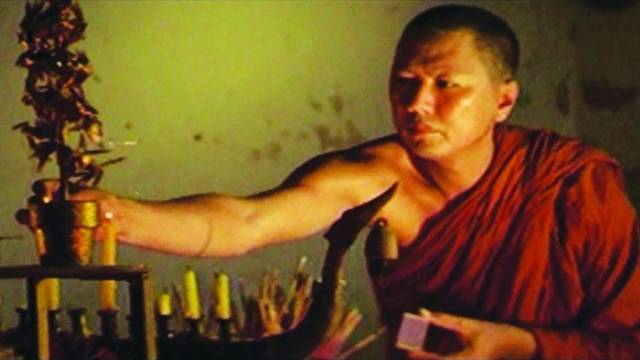
RED BAMBOO, written, directed, and photographed by Permpol Cheyaroon, is quieter, rural, and set in the past – the late forties. The two main characters, once childhood friends, are now abbott of the local Buddhist monastery and leader of the local communist cell. Both are concerned with the good of the people – but each begins in too didactic a manner. The Buddhist is complacent, unconcerned about politics or the way the people are used by the landlords and such – have faith and accept the way things are; in fact he’s a part of the establishment, a cog in the ruling machine. The communist is angry and rebellious – but his insistence on principle just adds to the suffering of his group and their families (he won’t allow them to obtain famine relief from the monastery). The clashes between the two are treated with a detached humour which doesn’t set up either as right or wrong – both are at fault, both are really quite human. When it becomes apparent that an unscrupulous businessman is out to screw the community (by over-lending, he forces people into debt so they’ll have to sign over their land; he also uses the monastery, by sending in a phony wandering monk who sets up a lottery racket to take the people’s money, forcing them to borrow more; his plan being to set up a dam on the land he obtains and so control the local water supply for his own profit), the two of them work together to bring him to justice. For all its evenness of treatment, though, in the end the communist’s aggressiveness proves essentially unnecessary – what matters are his principles, his commitment to helping people. These he shares with the Abbott. And it’s the latter’s calm (now stripped of pride and hypocrisy) which is clearly favoured. And unlike in THONGPOON KOKPO, in the end the authorities come along to collect the exploiting villain and the people can get on with their lives – the situation is similar, but the messages are quite different. Though the sound is a bit rough (as in THONGPOON), the photography is generally quite good, and the story is handled in a fairly entertaining way.
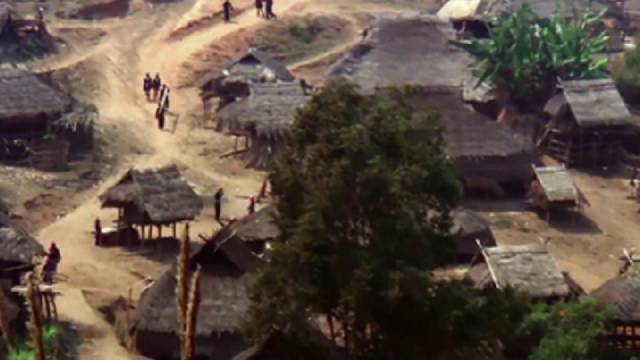
THE MOUNTAIN MAN (aka THE MOUNTAIN PEOPLE), written, directed, and edited by Vichit Kounavudhi, is a rambling story set amongst the hill tribes of Thailand, outsiders who settled there in closed communities, many supported by growing opium. The tale is fairly shapeless, following the wanderings of a young E-Gaw banished from his village when his wife bears twins (the babies are killed, the wife drowns soon after). He moves from village to village, an outsider, sometimes tolerated, sometimes forced to move on. He marries again; has a run-in with Chinese Haw opium traders – which leaves three men dead. With his wife, he’s arrested for murder, but turned loose by a sympathetic policeman, to continue his wandering. The actors are likeable, the locales vivid and colourful. Much of the time, it looks like a National Geographic documentary on tribal life. By turns funny and shockingly callous (the killing of the babies was very disturbing – worse since by that time I was fairly exhausted and emotionally susceptible), its flavour of authenticity helped to carry it through the slow, shapeless plot. And the humour of the people, their easy attitude towards hardship, sex, opium growing, and other matters prevented it from ever slipping into the dry detachment of an anthropological documentary. On the whole, I think it was the best of the three Thai films.
*
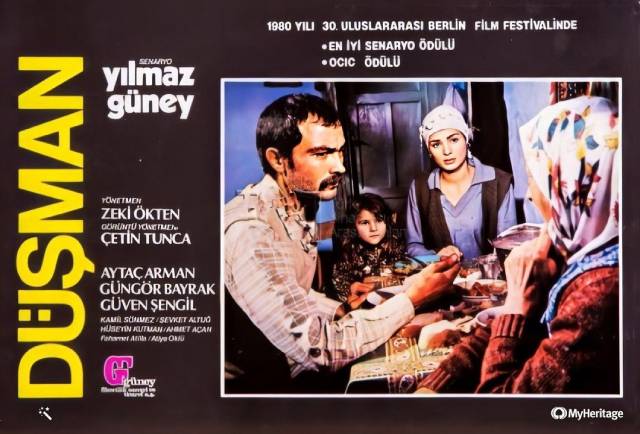
Possibly the worst of the Asian films I saw at the festival was THE ENEMY. This Turkish film, running more than two and a half hours, was numbing. It is long, tedious, and openly moralistic. It states its points again and again – “the enemy” is poverty, and its roots in an unfair, oppressive social system; it causes the disintegration of relationships, the isolation of the individual – and thus perpetuates the system. The handling is clumsy and obvious, its “ironies” delivered like sledgehammer blows; the people who laugh at a hysterical woman’s suicide attempt and at the death in the street of a man desperate for work, shout “cruelty” when they see a town worker poisoning stray dogs. Everyone thinks only of self, not realizing until it’s too late that only cooperation can save them. The point is peculiarly undercut, though, by an odd (to my mind) social attitude: even when the protagonist has got the point, he insists that his unfaithful wife must die – even though she’s as much a victim as himself.
There is little sense of dramatic storytelling as it lumbers from one interminable scene to the next, and, typically, the subtitling was dreadful. It was an excruciating experience, aggravated by what appeared to be a lot of real cruelty to animals.
The background is far more interesting than the film itself: it was written and produced by Yilmaz Güney, a leftist serving a long prison sentence for the murder of a judge, and directed by Zeki Ökten following Güney’s detailed notes. A pity it was such a waste of time….
*
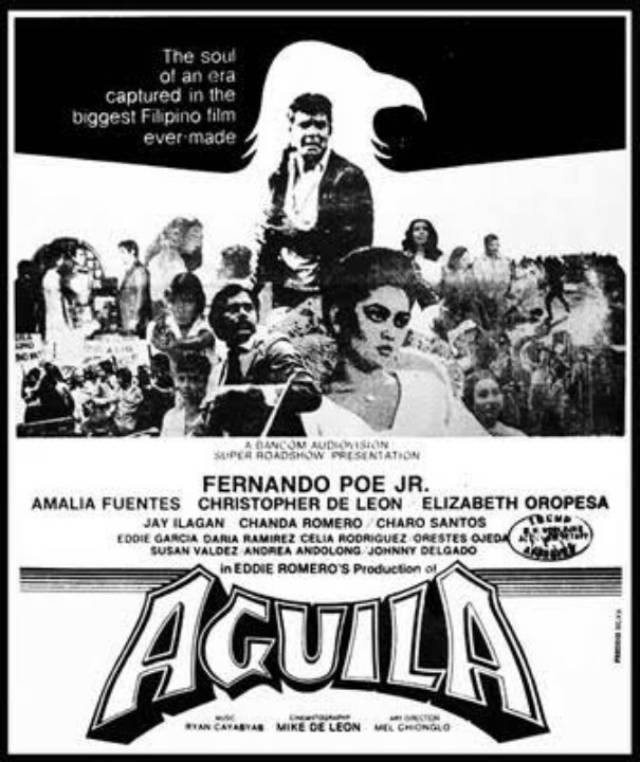
At the other end of the scale was Eddie Romero’s AGUILA, a huge Philippine epic, and a revelation, coming from a director generally known for his schlock horror and exploitation films. Cross-cutting through an eighty-odd year period, it traces the story of one man through the turbulent politics of the Philippines from the crushing of the 1890’s revolt to the present day. Aguila begins as a boy, the son of a revolutionary who is betrayed; his mother marries a pro-American (in fact, the man who betrayed his father); he grows up to join the army – caught between the establishment and his own liberal ideals. His son in turn becomes an idealistic politician who quickly succumbs to the pressures and temptations of the system. As the film opens, Aguila has been missing, presumed dead, for almost ten years. His son, getting a lead as to his whereabouts, feels driven to find him. The film cuts between his search and the story of his father’s life. It chronicles the gradual loss of ideals with increasing age (both personal and national), the way a man slowly becomes what he once fought against. The father fled this knowledge about himself, looking for a new start back in his roots – his son comes to the realization of this as he searches and in the end is ready and willing to look for a new course.
The film is well-structured, the parallel narratives meaningfully intercut. But at times a bit confusing because of the large number of characters to be kept track of (who unfortunately seem to age at different rates). It’s a flawed film, yes, but it is also intelligent, with a consistently interesting, justified epic scope.
Comments